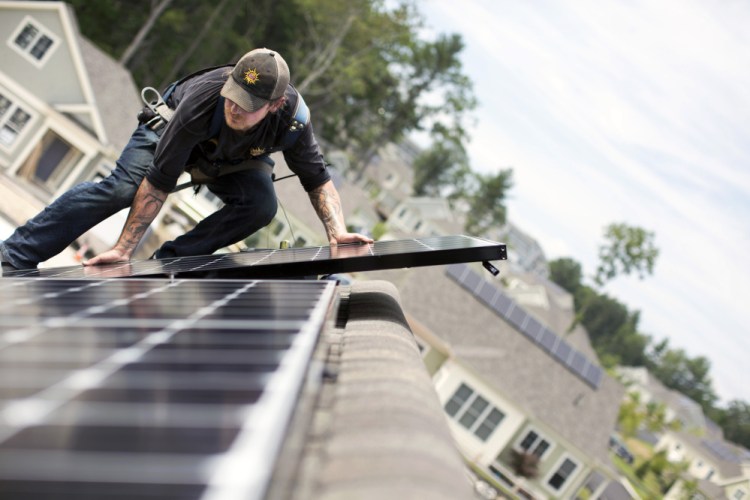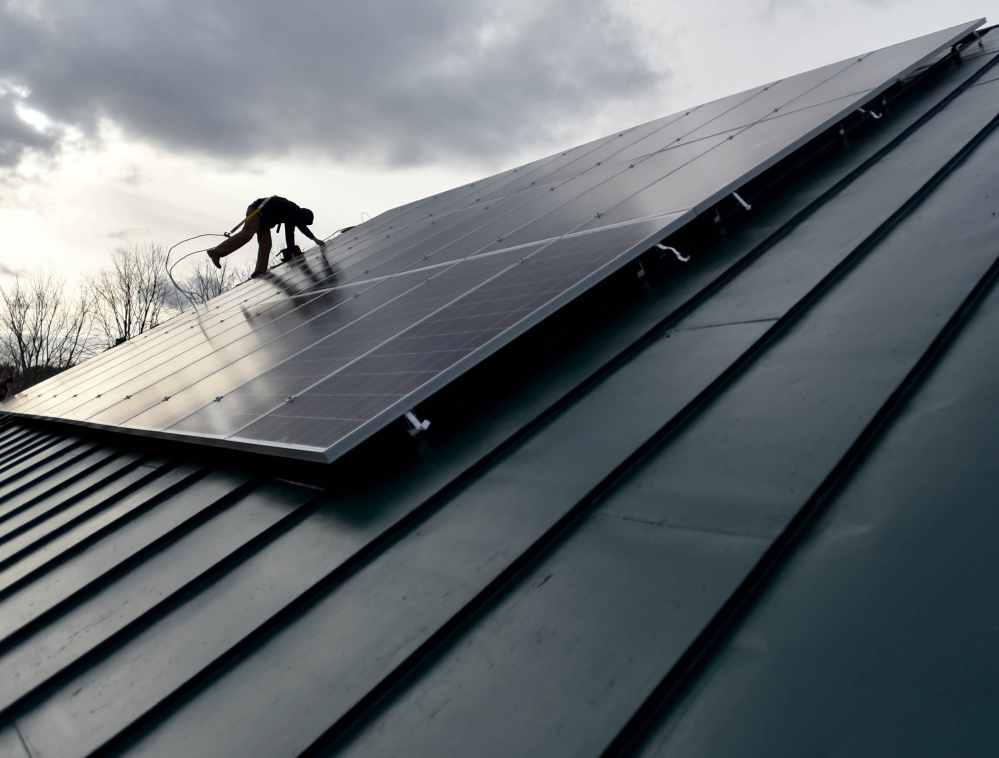HALLOWELL — Maine’s rooftop solar installers won a four-month reprieve Tuesday when the Maine Public Utilities Commission voted to delay implementation of a rule on how people who install new systems next year will be compensated for electricity they feed into the grid.
The current net-metering rule requires utilities to pay small energy generators the full retail price for the electricity they send into the grid. But under the new rule, systems installed after Dec. 31 would have seen the credit on their electric bills reduced over time.
The PUC decision pushes that deadline to April 30, so systems installed before then will be subject to the current level of compensation.
Net metering was devised in the 1990s to encourage renewable energy development. Opponents say it’s obsolete in an era when the cost of solar panels has fallen dramatically. But homeowners have come to expect net metering, and it has become part of the business model for rooftop solar installers. For these and other reasons, net-metering rules are being debated and modified across the country.
Roughly 40 states and the District of Columbia have net-metering policies, according to Utility Dive, an online newsletter that covers energy issues. It noted that the clashes over how to compensate owners of solar panels have caught the attention of the U.S. Department of Energy.
In September, the agency announced it will conduct a study of the costs and benefits of net metering for ratepayers and utilities. The study is part of the agency’s research into the reliability and resilience of the nation’s electric grid.
Tuesday’s action by the PUC also may have a broader impact.
Led by the Conservation Law Foundation, clean-energy advocates are challenging the PUC’s net-energy billing rule in Maine Supreme Judicial Court. Oral arguments are set for Dec. 13.
“We argue that the revised rule must be invalidated, because it assesses new rates and charges to net-energy billing customers in violation of various statutes,” said Sean Mahoney, the group’s executive vice president.
Mahoney noted that Supreme Judicial Court decisions after oral arguments typically take at least a month, and up to six months. The new date set by the PUC makes it more likely that a court ruling will be in hand before the planned new rule goes into effect.
NEW CHANCE FOR MODIFYING SOLAR LAW
The extension also opens the door for the Legislature to try – once again – to modify the law. That likelihood was raised soon after the vote by a co-chair of the Joint Standing Committee on Energy, Utilities and Technology.
“Today the Maine PUC did the only thing it could to avoid a train wreck,” said Seth Berry, D-Bowdoinham. “It hit the brakes on implementation of its disastrous, worst-in-the-nation rule on rooftop solar. The decision gives installers and customers more time to qualify under the old rules, and also gives the Law Court and the Legislature time to step in and reverse course altogether.”
Berry introduced a bill last spring that would have temporarily kept the current financial incentives in place, while directing the PUC to study the costs and benefits of rooftop solar. But lawmakers spooked by warnings from Central Maine Power Co. of higher electric rates sustained a veto of the bill by Gov. Paul LePage, by just three votes. L.D. 1504 had won strong initial support in both chambers, but that later faded in the House as Republican allies of the governor cast doubt about the impact on electric customers, and even the bill’s constitutionality.
It marked the second year in a row that LePage saw his veto of a key solar bill sustained by a narrow margin, illustrating the challenge that clean-energy advocates will face in a third effort.
The PUC decision Tuesday was hailed as a small victory by the Natural Resources Council of Maine, a chief opponent of the new rule.
“Today the PUC admitted that neither they nor utilities actually know how to implement their anti-solar rule,” said Dylan Voorhees, the group’s climate and clean-energy director. “Neither can yet provide solar installers or potential customers with the necessary information and guidance to implement the new rule or even say who it will apply to.”
Voorhees called the new rule unfair and too complex to carry out, and faulted the agency for relying on utilities to come up with the details.
“This delay,” he said, “gives lawmakers the time they need to stop Maine from sliding further backward on solar by overturning the harmful parts of this rule before it takes effect.”
For its part, CMP was circumspect in its reaction, and declined to speculate on potential actions in court or the Legislature.
“We appreciate the commission’s decision to allow more time for the parties to work through some of the complexities of administering the new net-metering rules,” said John Carroll, a CMP spokesman.
POLITICS, POLICIES AND INCENTIVE FORMULAS
Tuesday’s activity centered around compensation for net-energy billing or net metering, a longstanding and controversial financial incentive meant to promote renewable energy technology. Net metering matters because hundreds of jobs are tied to solar installations, and shifting policies about compensation can lead many residents to put off investing in solar.
In Maine, the PUC rule approved last winter would have grandfathered all existing net-metering customers, and any who installed solar before Jan. 1, 2018, for 15 years. Their incentives would stay as they are today.
New customers who install solar over the next 10 years, however, would have the credit on the transmission and distribution portion of the electric bill gradually decreased. For instance: Based on Tuesday’s action, any net-solar customers who install systems after April 30 would be credited 90 percent on the transmission and distribution portion of the bill, each year, for 15 years. They would still get a full credit on the supply portion of the bill.
The reasoning behind the formula, the PUC said, is to try to match financial incentives with the expected pace of falling equipment prices, thereby maintaining a similar payback on investment for homeowners.
STRIKING A BALANCE, OR A ‘WAR ON SOLAR?’
When the rule was passed last winter, the commission considered it an attempt to strike a balance. Solar installers didn’t see it as a compromise, but part of what the Natural Resources Council of Maine characterizes as a “war on solar” by the PUC, CMP and LePage.
Installers insist that retaining the full retail credit on net metering is important to growing solar energy use and that it provides benefits beyond power costs. Utilities and some politicians, including LePage, counter that compensating homeowners for the excess power they sell shifts costs to electric customers who don’t have solar panels.
Tuesday’s action was sparked by a request for a temporary delay of the rule by Insource Renewables, a Pittsfield solar installer. Vaughan Woodruff, the company’s president, said differing ways that CMP and Emera Maine were interpreting the in-service date for installations, and the lack of written guidelines, were confusing for his business and customers.
During deliberations, the PUC’s chairman, Mark Vannoy, acknowledged the lack of clarity and called on the utilities to cooperate in resolving remaining issues. After the vote, Woodruff said the outcome addressed his short-term concerns.
“I think it was needed and a very pragmatic approach,” he said. “It will give time for the utilities to write something that’s consistent with the rule.”
Tux Turkel can be contacted at 791-6462 or at:
tturkel@pressherald.com
Twitter: TuxTurkel
Send questions/comments to the editors.




